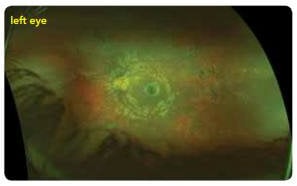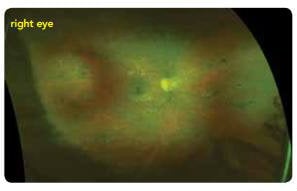Surgeons at the University of Michigan Kellogg Eye Center performed the first bionic eye surgeries in January, a little less than a year after the U.S. Food and Drug Administration (FDA) approved the Argus II retinal implant device. The Kellogg Eye Center is one of 12 facilities in the U.S. offering bionic eye surgery.
The device was designed to replicate certain functions of the retina for patients suffering from retinitis pigmentosa. While Argus II will not completely restore a patient’s vision, researchers and surgeons expect that patients “will be able to see objects, or lights in front of them,” Kellogg Eye Center surgeon Dr. Thiran Jayasundera told WZZM13.


The optomap® images above helped confirm a pediatric case of retinitis pigmentosa. The Argus II implant creates “an abstract, rudimentary vision” for patients with this condition, helping them to distinguish light and certain objects.
However, those results will not be immediate. Patients must first fully recover from the implant procedure, and then doctors will activate the patient’s bionic eye. Afterwards, patients will go through one to three months of training to help them adapt to their new bionic eye and new vision capabilities. Dr. Jayasundera said the training will help each patients’ brain “learn to sort through the many impulses that are stimulated when recipients turn their head in different directions.”
Linda S., the first patient to receive the surgery, is hopeful that she will be able to see her grandchildren with the device. While she knows she won’t be able to distinguish their faces, she is excited to be able to see different objects and figures, as well as her grandchildren running through the yard. “That just means a lot to me,” she said.
Dr. Jayasundera says this is a step in the right direction for patients with retinitis pigmentosa and expects that as research and technology continue to improve there will be more devices like Argus II to come.
It will be interesting to see what progress will be observed in the first patients to receive this bionic eye surgery. Of course, news like this reminds us that making sure patients understand the importance of good retinal care and comprehensive eye exams that include ultra-widefield (UWF) retinal imaging is a continual process. Optos offers several UWF imaging devices capable of taking high quality images of a patient’s retina in seconds. Visit our website for more information, or request a consultation with a representative to learn more!